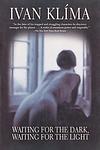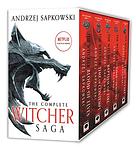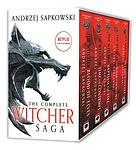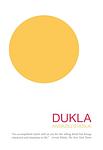The Greatest Polish, Czech "Fiction" Books Since 1970
Click to learn how this list is calculated.
This list represents a comprehensive and trusted collection of the greatest books. Developed through a specialized algorithm, it brings together 300 'best of' book lists to form a definitive guide to the world's most acclaimed books. For those interested in how these books are chosen, additional details can be found on the rankings page.
Genres
Countries
Date Range
Reading Statistics
Click the button below to see how many of these books you've read!
Download
If you're interested in downloading this list as a CSV file for use in a spreadsheet application, you can easily do so by clicking the button below. Please note that to ensure a manageable file size and faster download, the CSV will include details for only the first 500 books.
Download-
1. The Unbearable Lightness of Being by Milan Kundera
Set against the backdrop of the Prague Spring period of Czechoslovak history, the novel explores the philosophical concept of Nietzsche's eternal return through the intertwined lives of four characters: a womanizing surgeon, his intellectual wife, his naïve mistress, and her stoic lover. The narrative delves into their personal struggles with lightness and heaviness, freedom and fate, love and betrayal, and the complexities of human relationships, all while offering a profound meditation on the nature of existence and the paradoxes of life.
-
2. Franz Kafka: The Complete Stories by Franz Kafka
This collection of stories offers a comprehensive look at the work of a renowned author, known for his surreal and often unsettling depictions of modern life. The stories explore themes of existential anxiety, guilt, and absurdity, often through narratives in which ordinary people face extraordinary, inexplicable circumstances. The collection showcases the author's unique style and his profound influence on 20th-century literature.
-
3. The Book of Laughter and Forgetting by Milan Kundera
This novel is a blend of fiction, autobiography, and philosophical musings that explores the nature of forgetting, the power of laughter, and the struggle for personal and political freedom. Set against the backdrop of the political turmoil in Czechoslovakia in the 20th century, it follows the interconnected stories of various characters, including a man who is expelled from the Communist Party, a young woman in love with a man whose father was a political prisoner, and a couple who flee to America. Throughout, the book delves into the ways in which personal and collective memories shape identity and history.
-
4. I Served The King Of England by Bohumil Hrabal
"I Served The King Of England" is a captivating novel that follows the life of a young Czech waiter named Ditie, who dreams of becoming a millionaire and serving the highest-ranking clientele. Set against the backdrop of World War II and the Communist regime, the story takes readers on a journey through Ditie's experiences in various hotels and restaurants, his encounters with eccentric characters, and his pursuit of love and success. With humor, wit, and a touch of satire, the book explores themes of ambition, identity, and the impact of historical events on an individual's life.
-
5. The Futurological Congress by Stanislaw Lem
In a dystopian future, the protagonist attends a scientific conference where he is exposed to a new hallucinogenic drug that transports him to a surreal and chaotic world. As he navigates through this bizarre reality, he becomes entangled in a conspiracy involving mind-altering technology, political manipulation, and the struggle for power. This satirical novel explores themes of reality, identity, and the dangers of unchecked technological advancements.
-
6. The Engineer of Human Souls by Josef Škvorecký
The novel is a semi-autobiographical narrative of a Czechoslovakian writer who has become a professor at a Canadian university, teaching American literature. The narrative switches between his current life in Canada and his memories of the past in Czechoslovakia, including the Nazi occupation and the Communist regime. The book presents a complex portrayal of the life of an intellectual in exile and the challenges of cultural assimilation, while also exploring themes of love, politics, and the power of literature.
-
7. Drive Your Plow Over the Bones of the Dead by Olga Tokarczuk
This novel centers around an eccentric woman living in a remote Polish village, who becomes embroiled in a series of mysterious deaths occurring in her community. As she investigates, she is drawn into a deeper exploration of nature, astrology, and the human psyche, all while navigating the dismissive attitudes of the local law enforcement. The narrative is a blend of dark comedy, philosophical inquiry, and mystery, with a strong underlying commentary on animal rights and environmentalism.
-
8. Cutting It Short by Bohumil Hrabal
Set in a small Czech town during the 1920s, the narrative follows the life of a vivacious and free-spirited young woman married to the town's brewery manager. Her playful and unconventional behavior often leads to humorous and sometimes scandalous situations, as she navigates through the social norms and expectations of the time. The story captures the charm and eccentricities of rural life through a series of anecdotes, reflecting on the themes of freedom, tradition, and the joy of the everyday. The protagonist's zest for life and her interactions with the colorful cast of characters create a whimsical and endearing portrait of a community on the brink of modernization.
-
9. Too Loud A Solitude by Bohumil Hrabal
The narrative centers around an elderly man who has spent his life compacting paper and books into bales in a decrepit cellar, using a hydraulic press. Despite the menial nature of his job, he has cultivated a deep love and profound knowledge for literature, philosophy, and art from the books that pass through his hands, many of which he rescues from destruction. The story is a poignant exploration of the power and resilience of the human spirit in the face of a dehumanizing, totalitarian regime, and a meditation on the enduring value of art and the written word. The protagonist's intellectual journey and his resistance to the oppressive forces around him serve as a metaphor for the survival of culture and individuality under oppressive conditions.
-
10. The Beautiful Mrs. Seidenman by Andrzej Szczypiorski
Set in Nazi-occupied Warsaw, the novel tells the story of Mrs. Seidenman, a blonde, blue-eyed Jewish widow who is arrested by the Gestapo. The narrative revolves around the eclectic group of characters in her life, including a young man who is in love with her and a lawyer who is determined to save her. The book provides a vivid and poignant depiction of life under Nazi rule, exploring themes of survival, resistance, and the resilience of the human spirit.
-
11. Waiting for the Dark, Waiting for the Light by Ivan Klíma
The novel is set in the twilight of Communist rule in Czechoslovakia and follows the life of a television cameraman named Pavel. Despite his dreams of becoming a filmmaker and capturing the truth, he is trapped in a job that requires him to distort it. As the regime starts to crumble, Pavel grapples with the opportunities and challenges that freedom brings. He is forced to confront his past, his moral choices, and his dreams, leading to a deep exploration of the human condition and the struggle for personal and artistic freedom.
-
12. City, Sister, Silver by Jáchym Topol
This novel follows the journey of a young Czech man, Potok, as he navigates the tumultuous period of the Velvet Revolution and its aftermath. The story is filled with surreal and often disturbing imagery as it explores themes of chaos, transformation, and the struggle for identity in a rapidly changing world. Potok's adventures take him from the crumbling infrastructure of post-communist Czechoslovakia to the burgeoning world of Western Europe, and his experiences reflect the larger societal upheaval of the time.
-
13. The Complete Fiction Of Bruno Schulz: The Street Of Crocodiles, Sanatorium Under The Sign Of The Hourglass by Bruno Schulz
"The Complete Fiction of Bruno Schulz: The Street of Crocodiles, Sanatorium Under the Sign of the Hourglass" is a collection of two surreal and imaginative novellas by Bruno Schulz. In "The Street of Crocodiles," the narrator explores his childhood memories in a bustling town filled with eccentric characters and enchanting events. In "Sanatorium Under the Sign of the Hourglass," the protagonist finds himself in a peculiar sanatorium where time seems to stand still, leading to a series of dreamlike encounters and introspective musings. Schulz's unique writing style and vivid descriptions create a captivating reading experience that blurs the line between reality and fantasy.
-
14. A Crown of Feathers and Other Stories by Isaac Bashevis Singer
"A Crown of Feathers and Other Stories" is a collection of short stories that delve into the human condition, often through the lens of Jewish culture and history. The tales are filled with elements of fantasy and folklore, exploring themes such as morality, love, loss, and the struggle between good and evil. The characters grapple with ethical dilemmas, personal identities, and the complexities of relationships, while the narrative style often combines realism with the supernatural, creating a unique blend of the mundane and the mystical.
-
15. Collected Stories by Isaac Bashevis Singer
The anthology is a compilation of short stories that delve into the complexities of human nature, morality, and faith, often through the lens of Jewish life in Eastern Europe and the immigrant experience in America. The tales, rich with folklore, mysticism, and philosophical introspection, explore themes of love, temptation, and the eternal struggle between good and evil. The author's masterful storytelling weaves together the mundane with the supernatural, creating a tapestry of narratives that reflect the author's own Yiddish heritage and his keen observations of the human condition.
-
16. Flights by Olga Tokarczuk
"Flights" is a fragmented and philosophical novel that explores the theme of travel and movement. Through a series of interconnected stories and reflections, the book delves into the nature of human existence, the complexities of modern life, and the desire for freedom and escape. With its poetic language and unconventional structure, "Flights" invites readers to contemplate the transient nature of time, the significance of journeys, and the search for meaning in a world constantly in motion.
-
17. Identity: A Novel by Milan Kundera
"Identity: A Novel" is a philosophical exploration of the complexities of love, identity, and the human psyche. It revolves around the lives of two lovers, Chantal and Jean-Marc, who are living in Paris. As their relationship progresses, they grapple with existential questions, the nature of identity, and the fear of oblivion. The novel delves into their individual and shared insecurities, their perceptions of each other, and how these perceptions shape their identities. The narrative offers a profound reflection on the intricacies of human relationships, the concept of self, and the role of memory and imagination in identity formation.
-
18. Blood Of Elves by Andrzej Sapkowski
This novel is the first in a series that delves into a richly imagined fantasy world, where the fate of the realms hangs in the balance. It follows the story of a young girl who is destined for great power and the group of protectors, including a famed witcher, who must safeguard her from numerous forces seeking to control or destroy her. As political turmoil, ancient magic, and personal vendettas intertwine, the characters are drawn into a complex web of alliances and conflicts. The narrative explores themes of destiny, the nature of good and evil, and the impact of past choices on the present, all set against a backdrop of intricate world-building and vividly described battles.
-
19. Judge On Trial by Ivan Klima
"Judge on Trial" is a novel that delves into the life of Adam Kindl, a judge in Communist Czechoslovakia who is struggling with the moral dilemmas of his profession and personal life. As he presides over a politically charged case, Kindl grapples with the oppressive regime's influence on justice and his own sense of integrity. The narrative explores themes of power, corruption, and the quest for truth, while also examining the complexities of love, fidelity, and the human condition. Through Kindl's introspective journey, the novel provides a poignant critique of the judicial and political systems of the time.
-
20. Largo Desolato by Vaclav Havel
"Largo Desolato" is a play that delves into the psychological turmoil of a dissident intellectual living under an oppressive regime. The protagonist, who has gained notoriety for a political essay, faces the paralyzing fear of being constantly watched and the possibility of arrest. As various friends, admirers, and government officials visit him, he grapples with the moral and existential dilemma of whether to stand by his beliefs or succumb to the pressures of the authorities. The play explores themes of identity, responsibility, and the nature of freedom, capturing the protagonist's struggle with his conscience and the surreal experience of living in a society where personal integrity is under siege.
-
21. The Witcher by Andrzej Sapkowski
This fantasy series introduces readers to a world filled with magic, monstrous creatures, and political intrigue, centered around the life of Geralt of Rivia, a Witcher. Witchers are humans who have been genetically modified and trained from a young age to hunt and kill monsters. Geralt, with his exceptional sword skills, navigates through the morally ambiguous landscape, often finding that humans can be more wicked than the beasts he hunts. Along his journey, he is entangled with powerful sorceresses, kings, and creatures of dark lore, all while grappling with his destiny and the concept of what it means to be human in a world where the line between good and evil is blurred.
-
22. Dukla by Andrzej Stasiuk
This book offers a series of evocative essays that delve into the essence of Dukla, a small town in Poland, through the lens of memory and sensory experiences. The author masterfully blends observations of the mundane with philosophical musings, painting a vivid picture of the landscape, its people, and the passage of time. Through his exploration of various locales, from bustling markets to serene natural settings, he invites readers to reflect on the nature of existence, the beauty of the overlooked, and the profound connection between place and identity. The narrative is a poignant reminder of how deeply our surroundings can influence our perceptions of the world and ourselves.
Reading Statistics
Click the button below to see how many of these books you've read!
Download
If you're interested in downloading this list as a CSV file for use in a spreadsheet application, you can easily do so by clicking the button below. Please note that to ensure a manageable file size and faster download, the CSV will include details for only the first 500 books.
Download




















